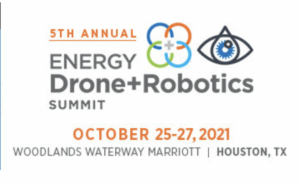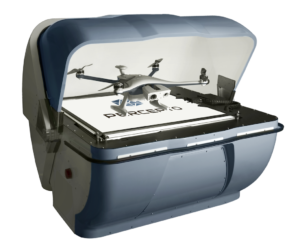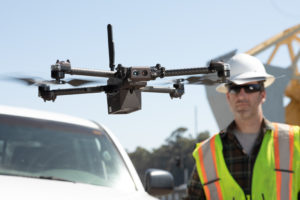 The Energy Drones and Robotics Summit Coalition kicked off in Houston, TX today. Dor Abuharisa of Percepto and Jack Dunn of Skydio offered keynote addresses on how autonomous drones and AI are contributing to the energy industry.
The Energy Drones and Robotics Summit Coalition kicked off in Houston, TX today. Dor Abuharisa of Percepto and Jack Dunn of Skydio offered keynote addresses on how autonomous drones and AI are contributing to the energy industry.
Percepto and Automated Inspections

Dor Abuhasira, CEO of Percepto, led off the keynotes to discuss how his company – with their ground-breaking autonomous drone-in-a-box solution – is addressing the needs of customers on six continents. Those customers include Florida Power and Light here in the U.S., where Percepto has helped the energy company to push the boundaries of disaster response and prevention.
In his presentation, Abuhasira said that there are four major challenges that enterprise companies face in complex inspections:
- Data collection: Getting good quality without increasing the cost is a challenge, Abuhasira said, which is impacted by inspection frequency, data quality, and AI compatibility;
- Comparison to historical data: with 1000s of images, companies don’t tend to use history data because the volume of data is unweildy;
- Data analysis: it can be very difficult for employees to spot a failure in the images without automation: in many cases, employees miss critical information;
- Access to the data and insights : communicating the insight is challenging, Abuhasira said: communicating the severity of a fault, for example, could get “lost in translation.”
Technology offers solutions. The best way to address these challenges, said Abuhasira, is to use one system from end to end: capturing data, organizing it, and making AI algorithms work with it.
The benefits of automated inspections are clear, and the Percepto CEO was happy to provide examples. For one customer, a privately maintained electric grid, the Percepto solution provides fully automated inspections including thermal imaging and AI-powered anomaly detection. “Frequent inspections are key to production rates,” Abuhasira said. “Customers can respond quickly to emergencies and don’t need to be onsite for maintenance and operations.”
What’s next? Customers are integrating ground robotics, including Boston Dynamics’ Spot.
“Taking automation to visual automation for an organization is a big step forward,” said Abuhasira. “I start by asking 3 questions: 1) What is the one facility or asset that absolutely needs this better inspection? 2) What is the one use cases we can start with? and 3) How do I communicate the value and results across the organization?”
Skydio, Autonomous Drones for the Energy Industry
 Jack Dunn, Account Executive at Skydio, gave the second keynote. As the leading US drone manufacturer and one of the first providers listed on the Blue sUAS list, Dunn says that Skydio provides more than 15,000 drones to over 420 public sector customers.
Jack Dunn, Account Executive at Skydio, gave the second keynote. As the leading US drone manufacturer and one of the first providers listed on the Blue sUAS list, Dunn says that Skydio provides more than 15,000 drones to over 420 public sector customers.
“We’ve partnered with most intelligent minds,” said Dunn, “and raised $340M to build our great solutions.”
Those solutions are based around Skydio’s autonomy platform, designed to lower the cognitive load for pilots and make it easier for enterprises to adopt drone technology. “Manual drones don’t scale,” Dunn said. “They’re hard to fly, easy to crash, abd require lengthy training.”
In addition to Skydio drones – which Dunn says can be up in the air faster; are safer from crashes; and fly closer to assets for better data – Skydio is moving towards an enterprise solution stack.
Skydio also offers compelling data to demonstrate the value of automated inspections. One customer who contracted with Skydio for inspection noted a 75% reduction in cost per bridge, and a 92% reduction in training cost for inspections performed with Skydio drones.
Skydio’s Autonomy™ Enterprise Foundation allows drones to “do more things in more environments,” Dunn said. Features like close proximity obstacle avoidance, precision mode to maneuver with ultra fine granularity, super zoom to capture details with 3x digital zoom, and vertical view to fly under and inspect what’s directly above help to improve inspection accuracy.
“Manual inspection is dangerous, slow, and error prone – yet critical,” Dunn said. Automated and AI-powered drones offer a solution for the energy industry and beyond for improving outcomes while lowering costs and barriers to entry.
See more about the Energy Drones and Robotics Summit on this episode of Dawn of Drones.

Miriam McNabb is the Editor-in-Chief of DRONELIFE and CEO of JobForDrones, a professional drone services marketplace, and a fascinated observer of the emerging drone industry and the regulatory environment for drones. Miriam has penned over 3,000 articles focused on the commercial drone space and is an international speaker and recognized figure in the industry. Miriam has a degree from the University of Chicago and over 20 years of experience in high tech sales and marketing for new technologies.
For drone industry consulting or writing, Email Miriam.
TWITTER:@spaldingbarker
Subscribe to DroneLife here.







[…] more about the Energy Drones and Robotics Summit, Commaris, Vantis, Harris Aerial, and […]